

To turn things around, we will need some inventive government policies and corporate commitment. We can speed up the transition by adopting policies that encourage citizens to buy electric vehicles and creating a network of charging stations so they are more practical to own. A nationwide pledge can help propel the supply of cars and drive down costs. The City of Dreams should emulate The City of Roses, California, which has committed to buying only electric buses by 2029 and banning the sale of gas-powered cars by 2035. Several countries in Asia and Europe too have announced goals to phase out fossil-fuelled vehicles in stages over the coming decades.

“To run all these electric vehicles we dream of having on our road, we would need a lot of clean electricity – a chief cause why it is imperative to deploy renewable sources and pursue breakthroughs in energy generation as well as storage. Electric vehicles are only as clean as their power supply!”
The readers of this newsletter could take a cue from the team at Penjana Kapital as they drive our attention and set our sights on another thematic release this month with the Electric Vehicles issue. But before you continue reading the imprint, I wish to share a few parting thoughts.
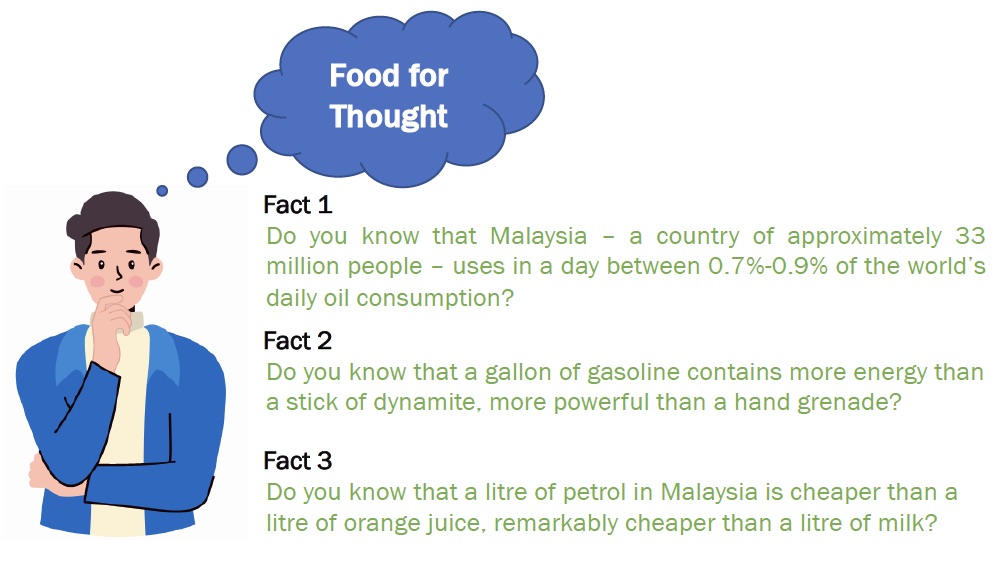
These questions are not to turn up the heat on the issue of sustainability. I want to point out the cold hard truth. For us to transition to a sustainable economy, we need to green the grid, fix our food system, and turn around how we travel.
“With climate challenges and costs lying ahead, we’d be firing up the presses and speeding up the transformation, now.”


Nonetheless, when it comes to Malaysia, our EV penetration is still very much lacking compared to our peers, with EV adoption standing at only 0.3% in 2021. Pivoting from internal combustion engine vehicles (“ICE”) to EVs requires a holistic approach and a complete ecosystem (much like our VC space). It requires all stakeholders, be it government, corporates or end users, to support the growing adoption. In other words, it requires demand to be cultivated by the necessary infrastructure and logical cost-benefit analysis.
Malaysian drivers are clearly interested in adopting EVs, especially due to its lower carbon emissions, lower interior noise and vibration, the convenience of home charging and lower dependency on fossil fuels, a depleting natural resource. However, a few factors still hinder the mass-market adoption of EVs in Malaysia.
While the cost of charging an EV might be relatively cheaper than refuelling an ICE from a charging vs fuelling standpoint, in the case of Malaysia, our petrol prices are still heavily subsidized by the government (Malaysia ranks among the top 10 nations with the lowest fuel prices in the world). This diminishes the attractiveness of EVs in terms of cost savings. However, fuel subsidies remain a contentious issue as they contribute a large portion of our government expenditure, putting its sustainability in question. As the government phases out fuel subsidies, owning an EV becomes more attractive.
However, it is also important to consider that the lower charging cost also comes with very long charging times. Depending on the EV model, type of charger used, i.e., AC vs DC, and level of charger, charging time can take up to 7 hours to charge an EV to its full capacity. Nonetheless, advances in EV charging technology have led to the invention of DC fast-charging, capable of charging EVs to their full capacity much faster than their counterparts. Effective implementation of DC fast-charging stations is, therefore, one of the key components to enable high EV adoption in any country. And this is where Malaysia is playing catch-up.
Unlike its closest neighbours, Malaysia still lacks sufficient charging stations to lure consumers towards EVs (even after considering population size). As such, proper studies that consider the exorbitant procurement and installation costs of DC charging stations, EV charging patterns and hotspots, and the feasibility of our current electrical infrastructures are needed. Only then will our “range anxiety” problem be solved.
Malaysia Competitive Landscape
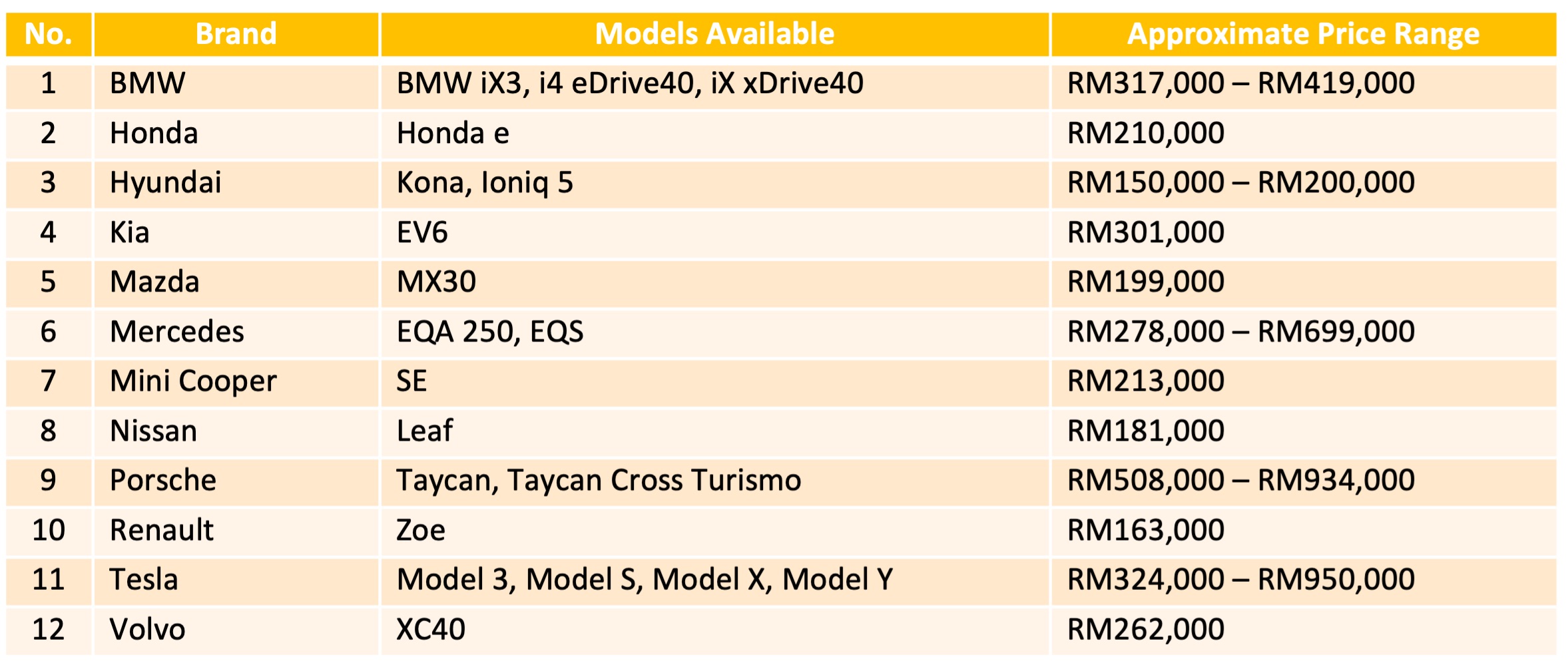
However, it will still be a steep uphill battle in terms of pushing for the adoption of EVs, considering the most popular car (i.e. Perodua Myvi) is a third of the price of the cheapest model currently available in the market (i.e. Hyundai Kona). On top of that, the local EV markets have always had ‘a chicken and egg’ problem – where local demand for EVs is heavily affected by the availability of charging infrastructure but charging infrastructure providers would only build up the network if there is sufficient demand.
The Bigger Picture
According to the Intergovernmental Panel on Climate Change, transportation contributes 15% of greenhouse gas (“GHG”) emissions. Hence EV, combined with low or zero-emissions electricity, offer the greatest potential to reduce GHG emissions in this sector.
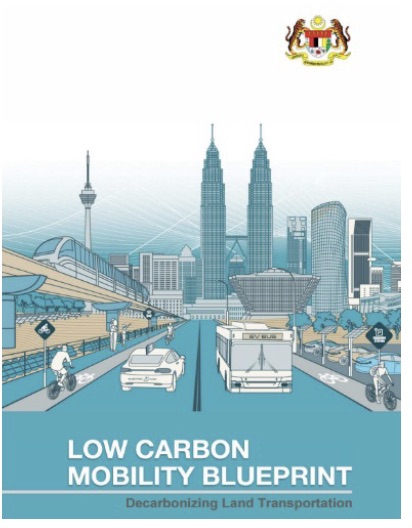
Government Nudges
As highlighted in our previous edition of The Kapitalist, innovation, especially in riskier areas, require government support to socialise the risks involved. To spur a nationwide adoption of EVs, the government should lead by example through the adoption of the use of EVs, in which it has committed to procuring EVs for its vehicle fleets beginning in 2023.
The Ministry of Environment and Water has issued the Low Carbon Mobility Blueprint 2021 – 2030, outlining plans to assess the best options in energy and GHG mitigation planning in the transport sector. This blueprint outlines a whole chapter on action plans for the adoption of EVs through, among others, government-led adoptions, government incentives, and infrastructure developments.
- Full import and excise duty exemptions for imported CBU EVs until 2023.
- Full import and excise duty exemptions and SST waiver for locally assembled CKD EVs until 2025.
- Road tax exemption and personal tax relief of up to RM2,500 for EV owners for costs relating to EV charging hardware and services until 2023.
Ecosystem Players

Illustrative Mobility Ecosystem
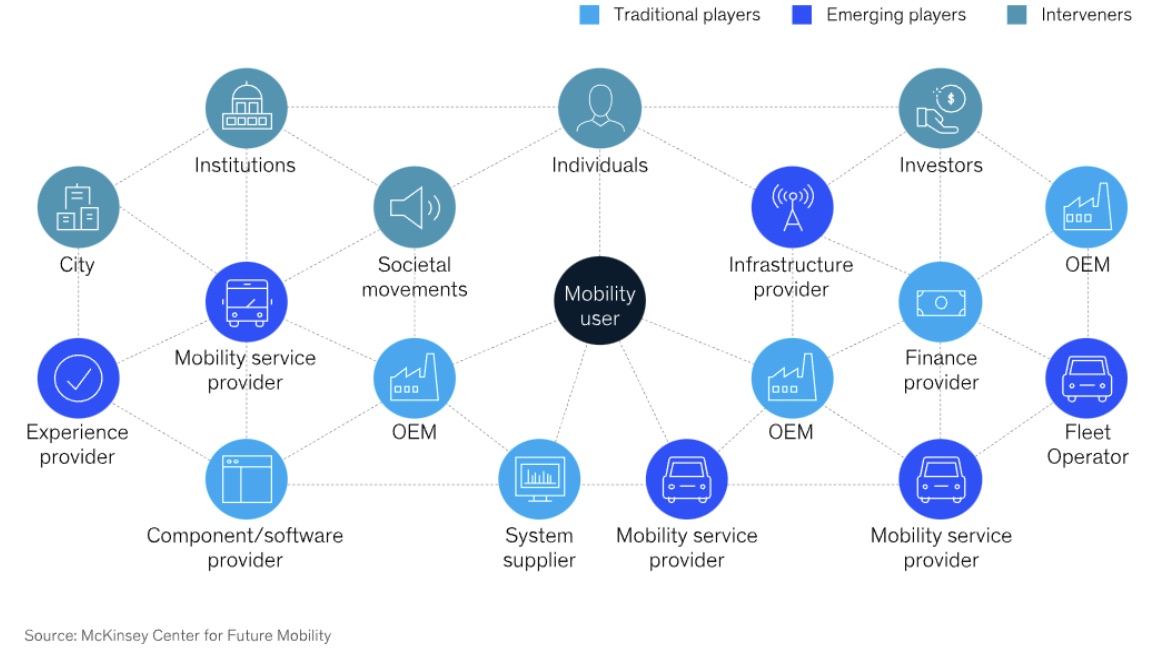
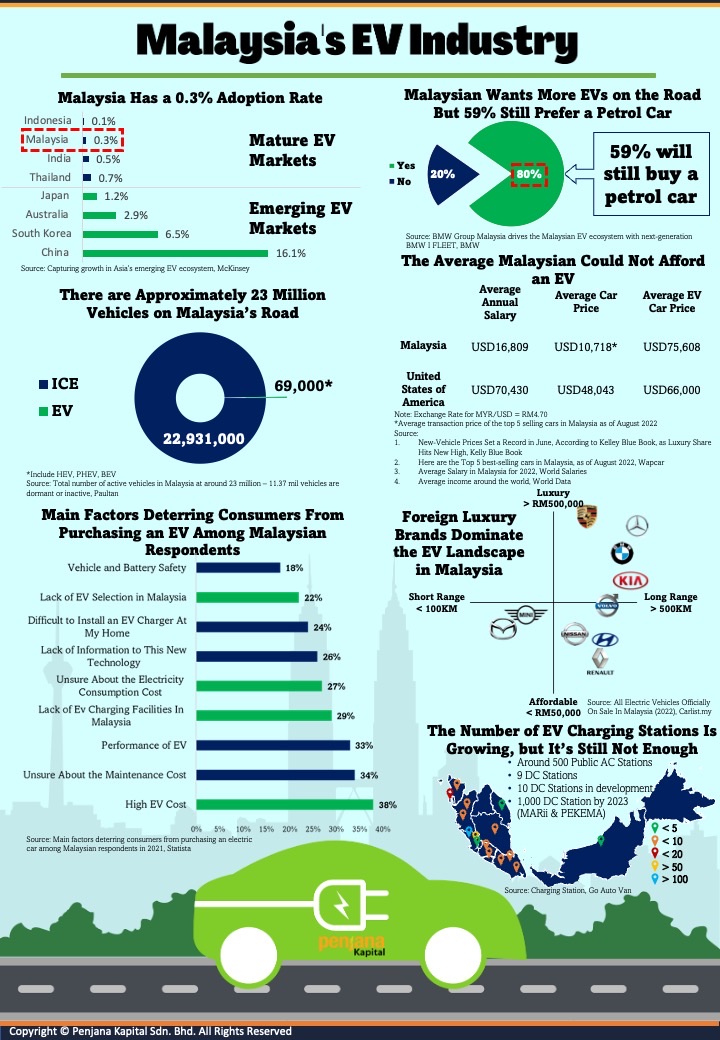

“The Capital Connections series is to showcase the country’s fast-growing startups and bring the industry’s best minds for learning, networking, and collaborating because together we will reshape the future of our industries.” Taufiq Iskandar CEO Penjana Kapital. As one of the largest e-commerce platforms in the Southeast Asia region, we are pleased to partner with Sea, the parent company of Shopee. We are hopeful that this collaboration will not only scale local sellers for sustainable growth but also stimulate the Malaysian economy and make it more inclusive.
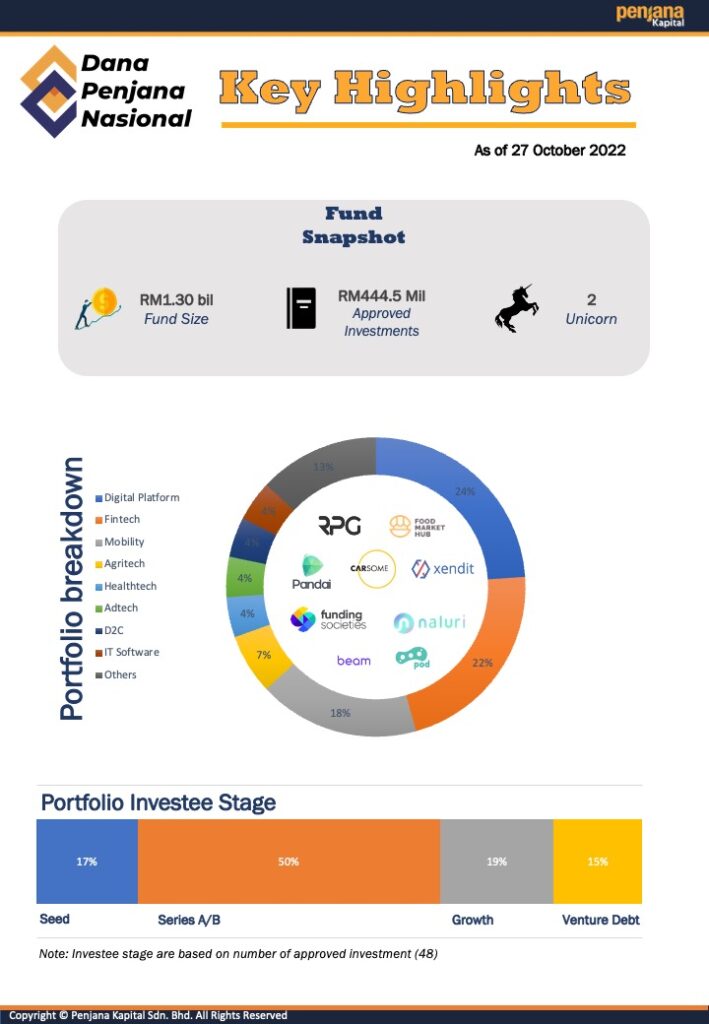
| DISCLOSURES AND DISCLAIMER |
This Newsletter is strictly informational and is issued Penjana Kapital Sdn Bhd (“PKSB”) on the basis that it is only for the information of the particular person to whom it was provided. This document may not be copied, reproduced, distributed or published by any recipient for any purpose unless Penjana Kapital Sdn Bhd’s prior written consent is obtained. This newsletter has been prepared for information purposes only and is not intended as an offer to sell or a solicitation to buy any securities, and/or any other product in Public or Private markets. Penjana Kapital Sdn Bhd is not making any recommendation to buy any securities or other product and the information provided should not be taken as investment advice.
It has been prepared without regard to the individual financial circumstances and objectives of persons who receive it. Penjana Kapital Sdn Bhd has no obligation to update its opinion or the information in this newsletter and Penjana Kapital Sdn Bhd recommends that you independently evaluate particular investments and strategies and seek the advice of a financial adviser prior to entering into any transaction. The appropriateness of a particular investment or strategy will depend on your individual circumstances and objectives. The information herein was obtained or derived from sources that Penjana Kapital Sdn Bhd believes are reliable, but while all reasonable care has been taken to ensure that stated facts are accurate and opinions fair and reasonable, we do not represent that it is accurate or complete and it should not be relied upon as such. All opinions and estimates included in this newsletter constitute our views as of this date and are subject to change without notice.
Penjana Kapital Sdn Bhd is not acting as your advisor and does not owe any fiduciary duties to you in connection with this newsletter and no reliance may be placed on Penjana Kapital Sdn Bhd for advice or recommendations of any sort. Nothing in this newsletter shall constitute legal, accounting or tax advice, or a representation that any transaction or investment is appropriate for you taking into account your investment objectives, financial situation and particular needs, or otherwise constitutes any such advice to you. Penjana Kapital Sdn Bhd makes no representations or warranties, express or implied, with respect to the accuracy of the information or fitness for any particular purpose and does not accept any liability (including but not limited to any direct, indirect or consequential losses, loss of profits and damages) for any use you or your advisors make of the contents of this newsletter or for any loss that may arise from the use of this newsletter or reliance by any person upon such information or opinions provided in the newsletter. This newsletter has been prepared by the analysts of Penjana Kapital Sdn Bhd. Facts and views presented in this newsletter may not reflect the views of or information known to other business units within Penjana Kapital Sdn Bhd. This information herein is not intended to constitute “research” as it is defined by applicable laws. This newsletter is not directed to or intended for distribution to or use by any person or entity who is a citizen or resident of or located in any locality, state, country or other jurisdiction where such distribution, publication, availability or use would be contrary to law or regulation. The information provided in this document has been obtained or derived from sources believed to be reliable. Penjana Kapital Sdn Bhd does not guarantee its accuracy or completeness and does not assume any liability for any loss that may result from the reliance by any person upon any such information or opinion. Such information or opinions are subject to change without notice, are for general information only and is not intended as an offer to sell or a recommendation/ solicitation to buy any securities, foreign exchange or other product.
